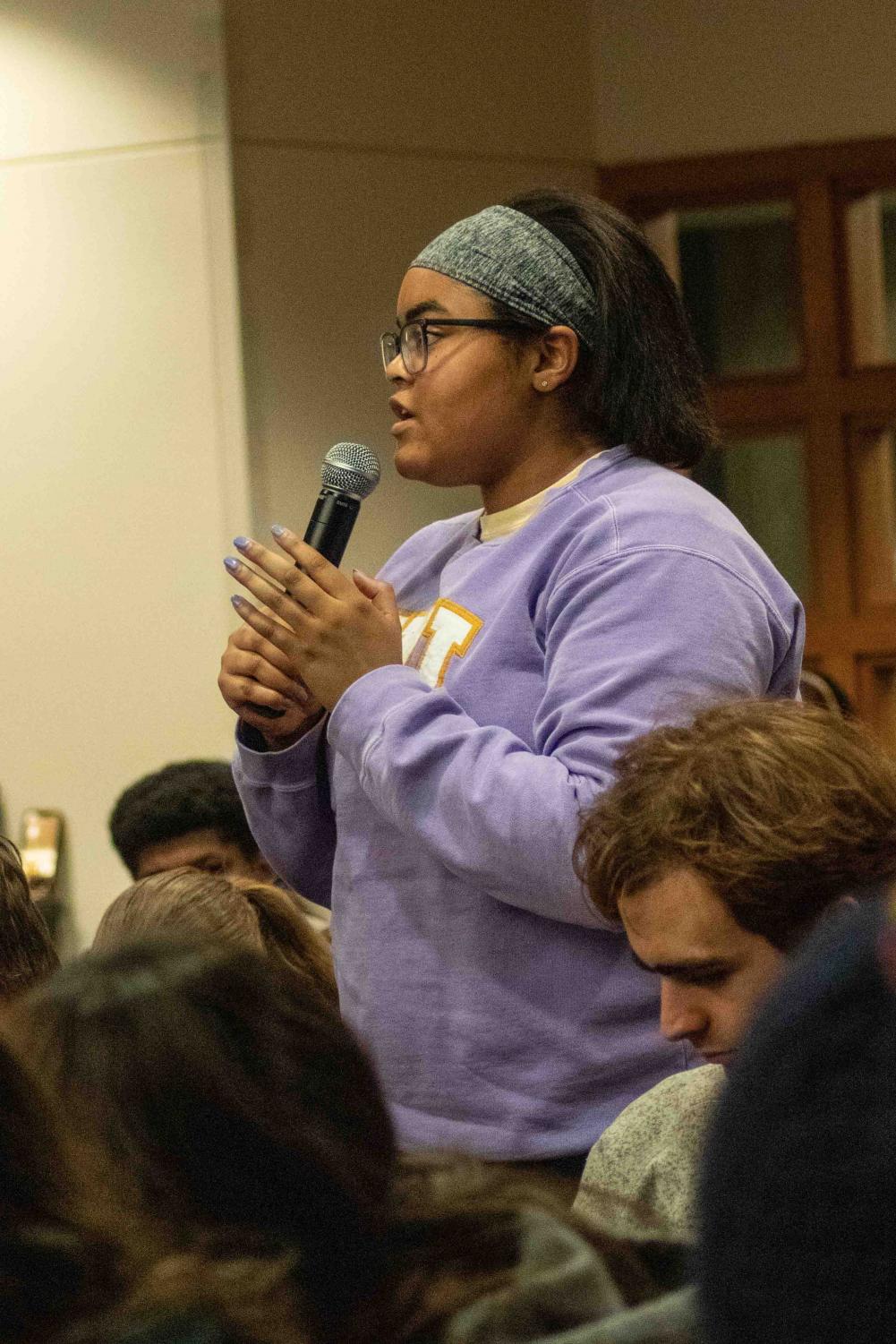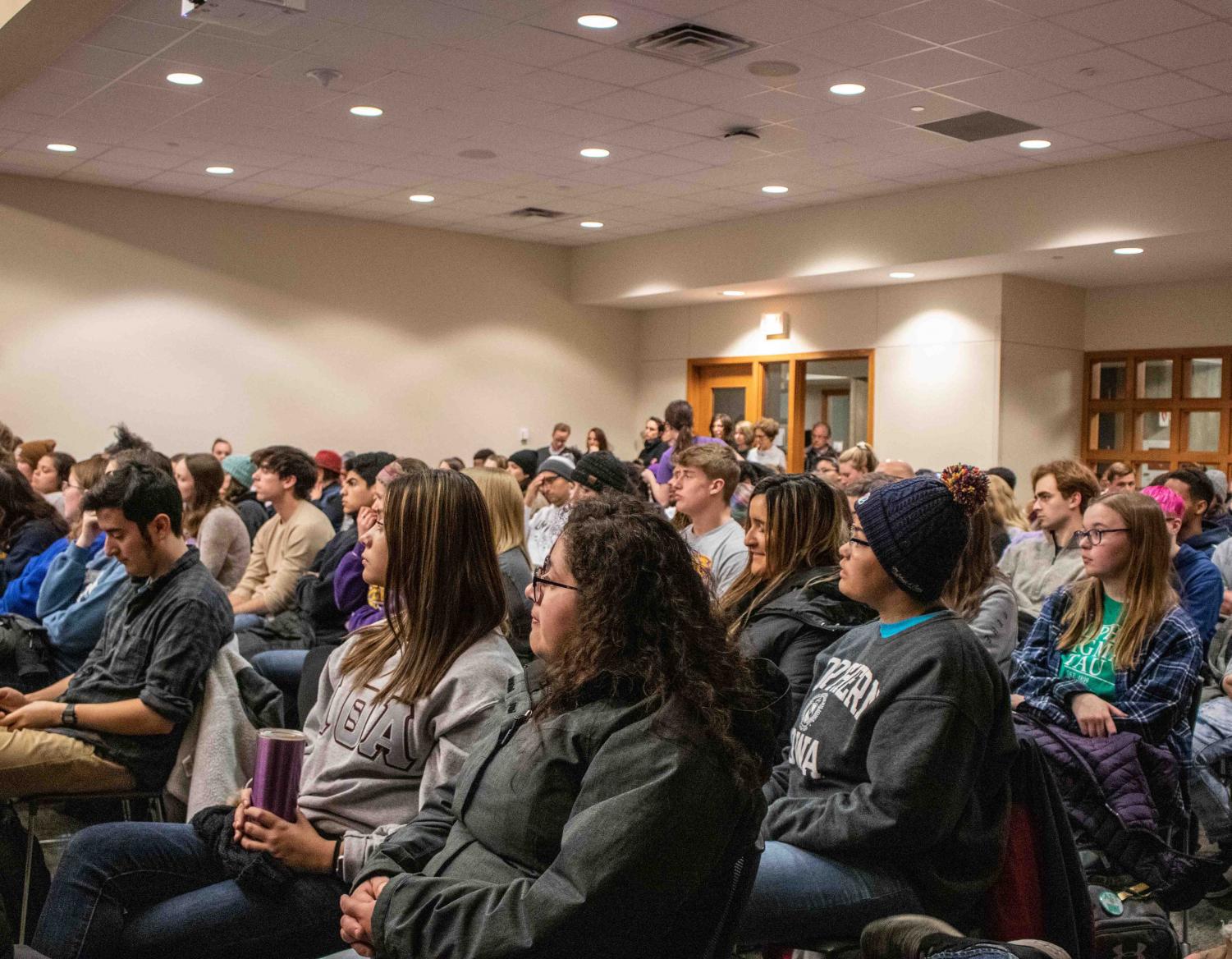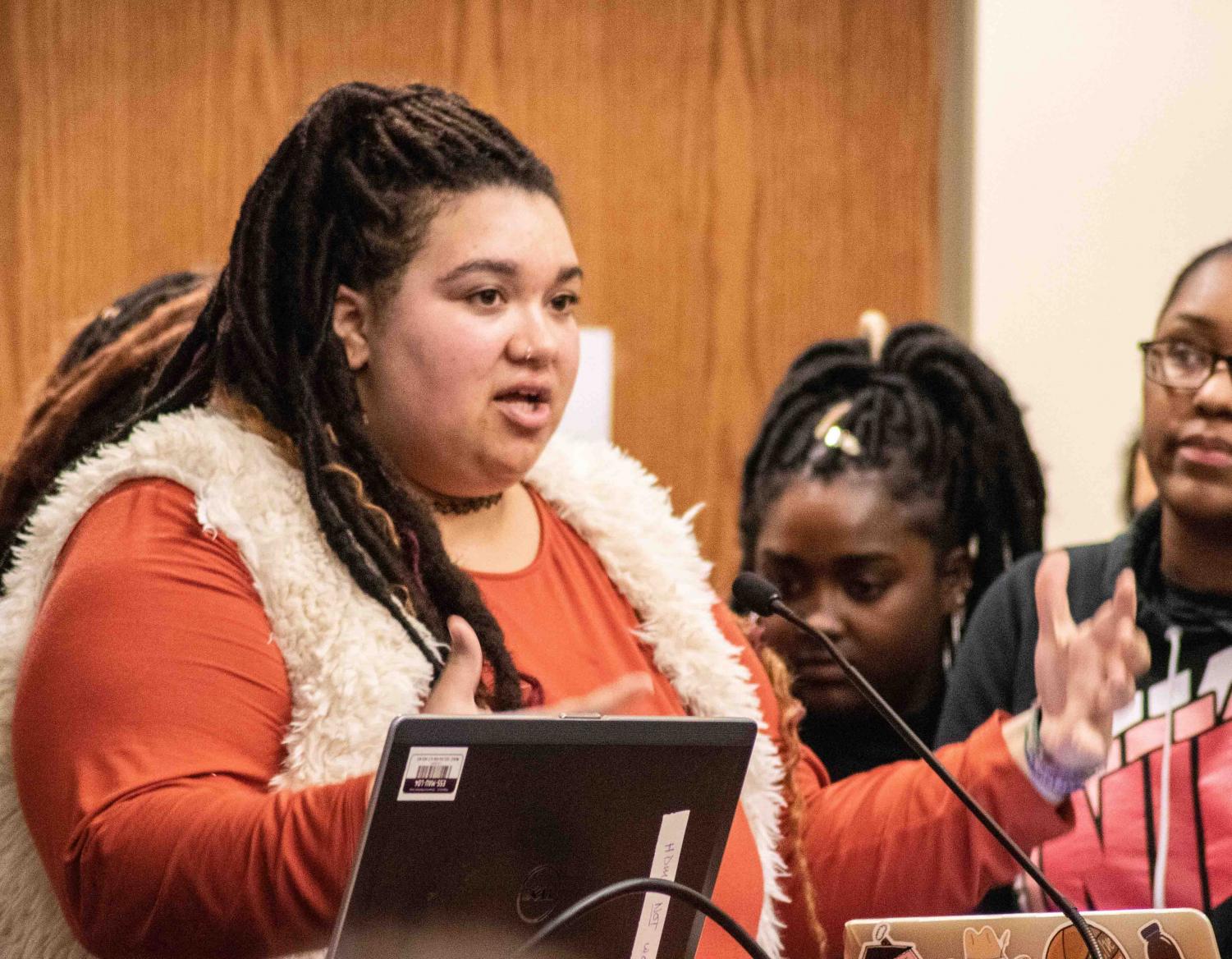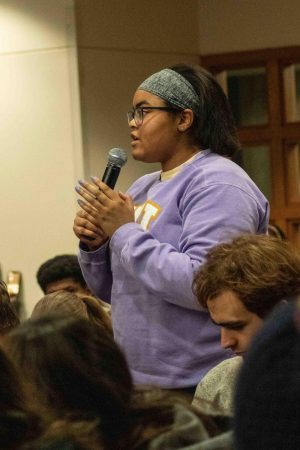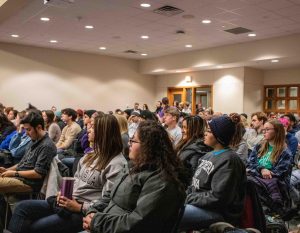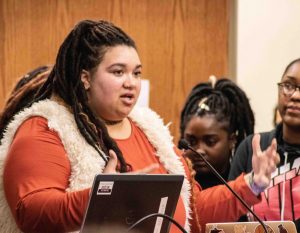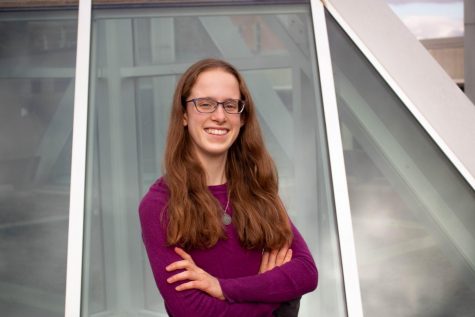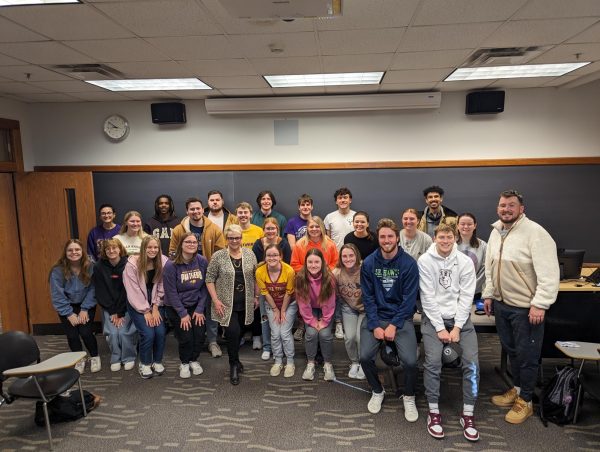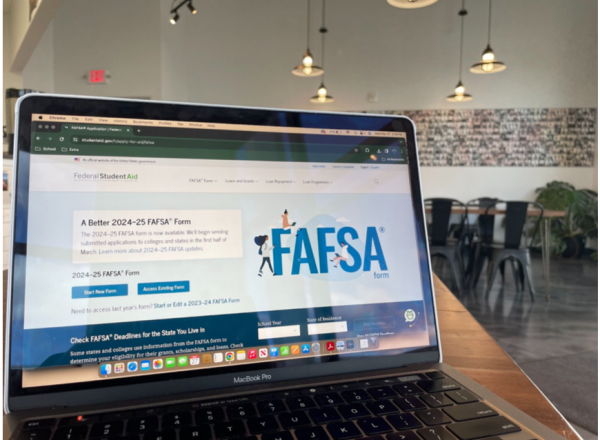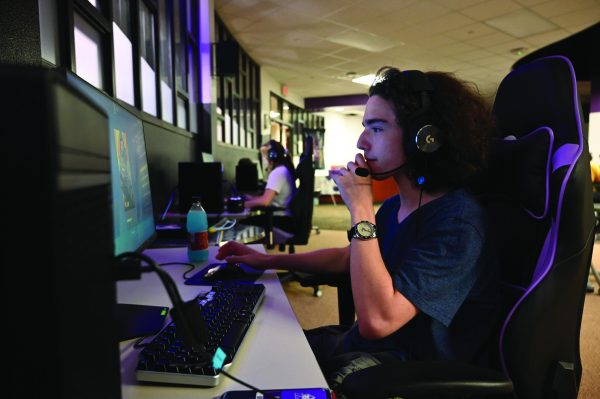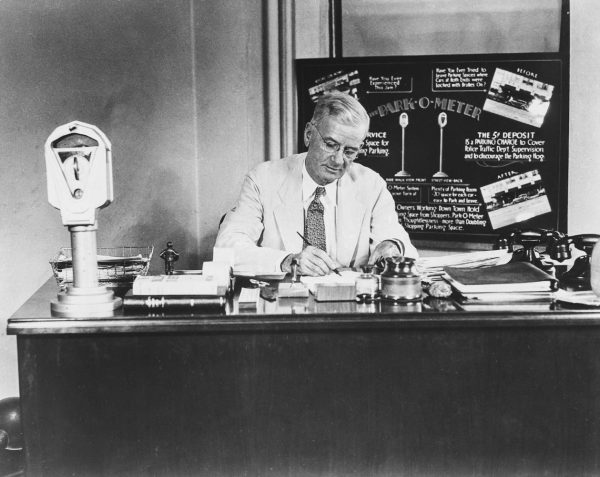UNI community packs REC town hall
Nov 14, 2019
More than 200 UNI students, faculty and community members attended a town hall hosted by the UNI Racial and Ethnic Coalition (REC) at 7 p.m. on Monday, Nov. 11, exceeding the capacity of the University Room in Maucker Union.
“I just want to take a second to appreciate all of you for coming,” said senior communications major and REC member Sashay Carroll. “We were not expecting this turnout whatsoever. I’ve never felt so supported by my community than I do in this moment.”
To accommodate the large crowd, a live stream was set up across the hall in the Oak Room. Allies in attendance were asked to give priority for students of color to be in the University Room, and many willingly gave up their seats to view the event from the live stream.
“We really appreciate allies being here, and this is also a space for you, [… but] students of color’s voices do come at a higher price in this area because we are talking about issues pertaining to students of color,” said senior psychology major and REC member Mahlia Brown. “If you do have questions, that is fine, but give precedence to students and faculty of color. This is a safe space for allies to listen.”
The event began with a summary of the formation of REC and the launching of their social media campaign, #UNIisnotanAlly, following the UNI administration’s “inaction” regarding mutually agreed-upon goals. The 13 members of REC introduced themselves and urged attendees to join one of the group’s four committees: PR/Social Media, Research, Recruitment and Focus.
“If you are not helping to fight against racism, you are complicit with racism,” Carroll said. “Ya’ll know that, right?”
REC members also addressed recent actions taken by UNI administration, including the Climate Survey sent to the UNI community on Oct. 30, which, according to Brown, had not been sent for three years. REC members have created their own additional climate survey, linked on their social media accounts, which they urged attendees to complete.
The floor was then opened for all attendees to ask questions and for students of color to share their experiences at UNI. Students described marginalization, racial profiling by university police and classroom microagressions, hurtful comments or actions that members of minority cultures experience in their day-to-day interactions.
“It’s hard being a black student here, so it’s hard to tell people ‘Come to UNI!’ when I don’t know that I love being here,” said senior economics major Rachel Greene, a member of Student Admissions Ambassadors (SAA). “But I love my education, so for those of you [here] that are professors […] thank you for coming, because it really means a lot to students of color like me who don’t see this here ever.”
In addressing the multiple faculty members present, students expressed their frustration at being asked to be the sole educators regarding their culture. Instead of relying on students of color to explain their own history, Brown said, faculty should educate themselves regarding cultural competency.
“Institutional racism and implicit biases are always at play,” Brown said. “Just because you think you are an ally doesn’t mean you necessarily are a helpful ally. You can think that you’re supporting students of color and be microagressing them. […] I would say towards faculty, educate yourself. Go to a workshop. Go to an educational program. One is not enough. Continuously educate yourself.”
Bre Eigenheer, sophomore English education major and student programs coordinator at the UNI Center for Multicultural Education (CME), mentioned the center’s educational events, such as their regular “Hot Wings, Hot Topics” discussion series. She said that she rarely sees faculty or administrators at these events and urged them to attend.
REC members emphasized their goal of addressing systemic issues rather than isolated incidents.
“REC is about creating systematic, institutional change for students of color,” Carroll said. “This is a movement. This is not a moment.”
Jamie Butler Chidozie, director of the CME, noted that UNI faculty and staff of color experience the same marginalization and called upon administrators to take ownership.
“I don’t want students to leave here feeling like the onus is on you to change systematic oppression […] here on campus,” she said. “You are here to be students and you should be in a place where you are thriving and it is clear that you are not. We are in a point where we can do some shifting, but the onus is not on you [as students]. It can’t be, because you are not the decision makers.”
The town hall was followed by breakout sessions. Students of color remained in the University Room, while allies moved to the Oak Room for an informational session led by REC members Brown, Laura Roman Jimenez and Ryan Frank. The three emphasized the critical role that allies play.
“When we have voices coming outside the 13 of us telling [administration] that they feel the same way, they take us a lot more seriously,” Brown said.
Jimenez, a senior business administration major, called for allies to make their support of minority students known by attending events hosted by student organizations such as UNIDos and Black Student Union (BSU). However, she and her fellow REC members also stressed that allies must “know their role” as listeners, learners and guests in spaces meant for marginalized populations, and must speak with students of color, not for them.
Senior social work major Isabella Pedersen found the evening informative.
“I really appreciated REC’s willingness to have conversations about how white students can be allies in this movement and their willingness to answer questions and take time to educate us,” she said.
Related: REC, students from Iowa and ISU attend Board of Regents meeting
In coordination with similar student organizations from universities across Iowa, members of REC attended the public comment portion of the Board of Regents committee meeting at 3:30 p.m. on Wednesday, November 13 in the Commons Ballroom.
Representatives from the “Does UIowa Love Me?” movement and Iowa State Students Against Racism joined REC at the meeting, along with members of statewide grassroots student organization Iowa Student Action. Becky Hawbaker, president of UNI United Faculty, also spoke on behalf of the assembled students.
REC member Gisselle Hererra, a senior social work major, delivered a statement on behalf of REC, addressing Board of Regents executives and representatives from all three of Iowa’s public universities.
“Students of color need to be recognized as integral parts of the university community – not just another source of revenue. Furthermore, the amount of control that the Board of Regents exercises over decisions that will ultimately impact students, with absolutely no racial diversity and little student representation, is fundamentally undemocratic and damaging to the experiences of students,” she said. “We are demanding a town hall meeting with the Board to have student voices be heard and that equitable and swift action will be taken.”
At the conclusion of the public comment portion of the meeting, Carroll asked Board of Regents members if they would be willing to meet with members of the student organizations in a town hall.
When silence followed her question, she reiterated, “Will you meet with us? Yes or no?”
The question was again met with silence.
“You have underestimated the power of students for far too long,” said Carroll as the assembled students filed out of the ballroom.


